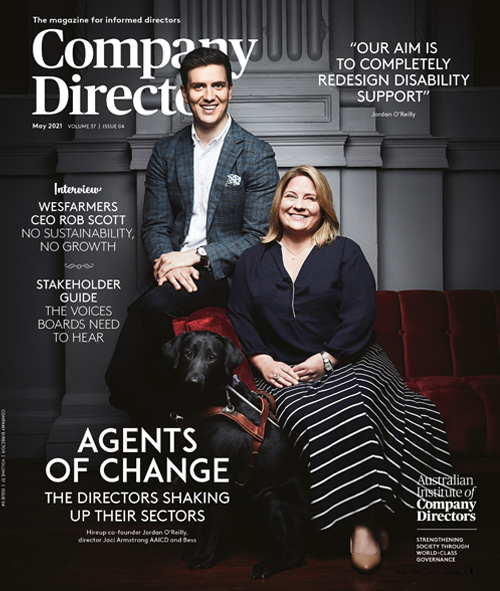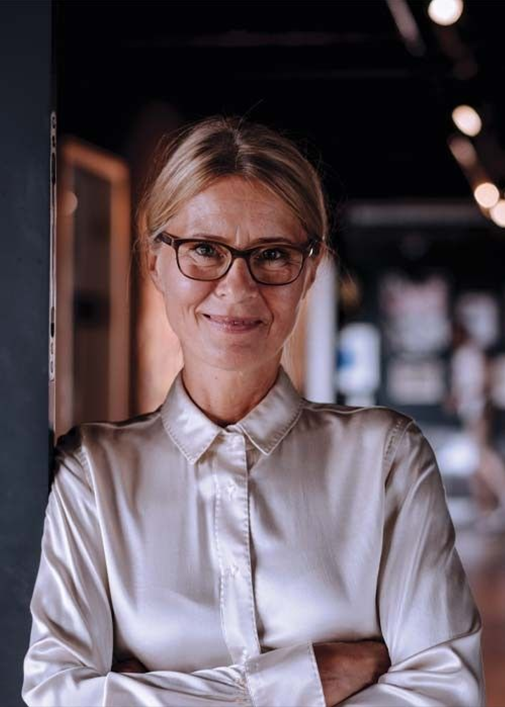The COVID-19 pandemic forced Ronni Kahn's food rescue charity, OzHarvest, to make strategic decisions that created a road map for growth for the stretched NFP.
In March 2020, just before the COVID-19 pandemic shut the country down, Ronni Kahn AO MAICD, founder and CEO of food rescue charity OzHarvest, and Lawrence Goldstone, the organisation’s chair, made a difficult call. They pulled their flagship fundraising event, the CEO CookOff, due to be held at the end of that month.
“[It was] one of the hardest decisions that I’ve ever had to be a part of,” acknowledges Goldstone — due to the impact it would have on OzHarvest’s ability to rescue food and redistribute it to charities that would feed people in need.
Although Goldstone was also grappling with the implications of COVID-19 as a partner at PwC Australia, the implications of the OzHarvest decision weighed more heavily. “You know that $3m provides around six million meals, which directly impacts individuals and their ability to function,” he says.
During that testing time, trust between the board and management team was crucial. “Usually, you have a longer period of incubation time to make strategic decisions, but some of the decisions we had to make were very much within the week, within the moment, and needing us to go with what felt right,” says Goldstone.
As demand for food relief increased, OzHarvest became busier than ever before. The organisation had to purchase food for the first time due to food supply chains being severely affected by the panic stripping of supermarket shelves and large-scale events grinding to a halt. Yet staff numbers grew by 70 to more than 200 during COVID-19, and volunteers now number more than 3000.
Kahn harnessed the same formidable powers of persuasion that had forced legislative changes 15 years earlier, allowing potential food donors to give their surplus food to charities without fear of liability.
“OzHarvest helped to secure $200m in federal funding for the charitable sector, of which we received $3.6m,” says Kahn. “Advocacy and lobbying — shifting and changing the status quo—isverymuchpartofwhoweare.Wehadto remind federal government there are 1.3 million people employed in the charity sector and it generates at least eight per cent of the GDP.”
OzHarvest ramped up its food rescue and redistribution efforts, and introduced new services, including a new “free” supermarket, pop-up hamper hubs in easy-to-reach locations, cooked meals by stood-down chefs, and mobile markets targeting regional NSW communities. Nutrition classes went online and 50 new schools joined FEAST, a STEM (science, technology, engineering, mathematics) project- based learning program focusing on food and sustainability.
“We put seven new vans on the road and we have supported 355 new charities that either popped up, or had been on a waiting list that we could not give help to previously,” says Kahn, who believes the organisation has never been in a stronger position from which to grow and deliver on its mission.
Board beginnings
OzHarvest started in 2004 with a single van in Sydney after Kahn, then running her own event management company, found herself aghast at the amount of food lying untouched after the crowds went home. The original board was pulled together at the behest of the Macquarie Group Foundation, which had been reluctant to provide funding unless Kahn formed a board.
But Kahn needed to keep working in her events business, meaning her attention was torn and she was stretched thin. As a result, board members needed to take on some management duties. Not knowing what was required to work with a board meant there was understandable tension between her and the members of that first board for a range of reasons. Kahn acknowledges this in her memoir, A Repurposed Life. She worked on instinct, chafed at structure, made unilateral decisions and didn’t write management reports. She juggled ever- increasing media demands, dashed in and out, and often flew by the seat of her pants.
“My first board was amazing, but I had no idea what I was doing,” says Kahn. “They were the right board at the right time, bringing structure, governance and oversight — but I didn’t have the skills that a traditional CEO of an organisation needed... and, personally, I struggled with their expectations of me.”
Kahn found herself in tears at board meetings because she didn’t feel valued or understood.
“I had been self-employed and never had to be accountable to others and, suddenly, there were corporate demands [being] made on me,” she says. “I took it personally in the beginning.”
There was also a perception among board members that Kahn’s main focus was on securing media coverage. However, she stresses that she never sought interviews, rather, the media, intrigued by her story, came to her.
As the face of the organisation, Kahn was chosen in 2010 as Australia’s Local Hero in the Australian of the Year Awards, in recognition of her work founding OzHarvest. She says that was the turning point when the board “realised I was there to stay and that it was time to recalibrate and refresh”.
OzHarvest had grown to the point where Kahn could formally assume a full-time paid position as CEO, having learned a lot about her role and responsibilities. Staff were hired to help manage the growing operational side of things, and existing board members began to make way for new ones.
“That really created a whole new dynamic,” says Kahn.
Governance dynamics
Kahn and Goldstone first met through associates in 2009 and, a year later, Goldstone ran OzHarvest stakeholders through a strategy session designed to focus and create a road map for growth. Instantly, there was an affinity.
“There’s an attraction to those people who have a goal, have a passion, have a vision and are delivering on it — it’s infectious,” says Goldstone. “As anybody in the OzHarvest ecosystem will tell you, once you meet Ronni and you’re in, you never get out. It’s just a question of how far and how fast yellow (the organisation’s signature colour) starts to run through your veins.”
As the organisation sought to scale for growth, Kahn looked to invigorate the board with a mix of strategy, technology, human capital and governance skills. Goldstone stayed on the strategy subcommittee before joining the board in 2016 and formally taking on the role of chair in 2020. “You need to have the right board for the right organisation,” he says. “The speed of innovation and change and the growth of the business probably outpaced the commitment and make-up of the board.”
Goldstone notes that directors on NFP boards need a blend of different skills. “There is the governance component, but it needs to be hands-on and practical — you need to be active within the organisation. If you only look at it from a governance perspective, you’re missing all the wonderful opportunities to be able to help it thrive.”
OzHarvest’s other non-executive directors include Woolworths executive Guy Brent MAICD, Facebook director of Small and Medium Business for Australia and NZ Melinda Petrunoff, Allens partner Kate Towey, and a 2021 Youth Influencer of the Year Yasmin Poole, who “brings a voice of a whole different part of the population that really hadn’t been represented before,” says Goldstone. Announcements are pending regarding a further one or two more board members.
Poole, along with Andrew Baxter FAICD, chair of Australian Pork, who brings a communications and marketing focus, and Brent, who comes from his position as one of OzHarvest’s major partners, all joined the board within the past 12 months.
“We did a review of our board charter and direction of the board profiles needed to support the vision of the organisation — so we understand the skills we have and the skills that are needed,” says Goldstone. “It’s been important for us to have the right mix of people who’ve been on the board a long time, alongside those who offer fresh thinking and representation.”
Kahn notes that organisations tend to be shaped by the personality of their founder, but there is plenty of space for evolution and changes in direction.
“I’m sure in 10 or 20 years’ time, when I’m long gone out of the business, it will be a very different organisation,” she says.
Latest news
Already a member?
Login to view this content




